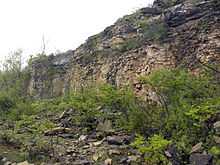Brassfield Formation
From Wikipedia, the free encyclopedia
| Brassfield Formation Stratigraphic range: Early Silurian | |
|---|---|
 Brassfield Formation exposed in Oakes Quarry near Fairborn, Ohio. | |
| Type | Sedimentary |
| Underlies | Dayton Formation |
| Overlies | Drakes Formation |
| Lithology | |
| Primary | Limestone |
| Other | Dolomite |
| Location | |
| Region | East-central USA |
| Country | United States |
| Extent | East-central USA |
| Type section | |
| Named for | Brassfield, Kentucky |
| Named by | Foerste (1906, p. 18, 27) |
The Brassfield Formation, named by A.F. Foerste in 1906, is a limestone and dolomite exposed in Ohio, Kentucky, Indiana, Tennessee and West Virginia in the United States.[1] It is Early Silurian (Aeronian, Llandoverian) in age and well known for its abundant echinoderms, corals and stromatoporoids.[2] In Ohio, where the unit has escaped dolomitization, the Brassfield is an encrinite biosparite with numerous crinoid species.[3][4]
References
- ↑ Foerste, A.F. 1906. The Silurian, Devonian, and Irvine formations of east-central Kentucky, with an account of their clays and limestones. Geological Survey of Kentucky, Bulletin 7, 369 p.
- ↑ Schneider, K.A. and Ausich, W.I. 2002. Paleoecology of framebuilders in Early Silurian reefs (Brassfield Formation, southwestern Ohio). Palaios 17: 237-248.
- ↑ Ausich, W.I. 1984. Calceocrinids from the Early Silurian (Llandoverian) Brassfield Formation of southwestern Ohio. Journal of Paleontology 58: 1167-1185.
- ↑ Coogan, A.H. 1996. Ohio’s surface rocks and sediments, in Feldmann, R.M., and Hackathorn, M., eds., Fossils of Ohio: Ohio Department of Natural Resources, Division of Geological Survey Bulletin 70: 31–50.

Close view of Brassfield Limestone near Fairborn, Ohio, showing grains mainly composed of crinoid fragments.
This article is issued from Wikipedia. The text is available under the Creative Commons Attribution/Share Alike; additional terms may apply for the media files.